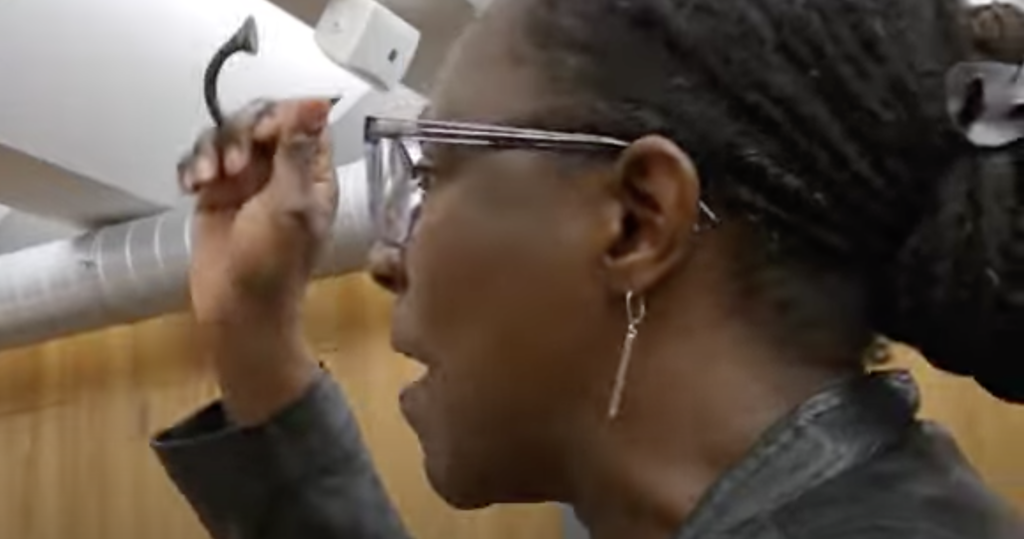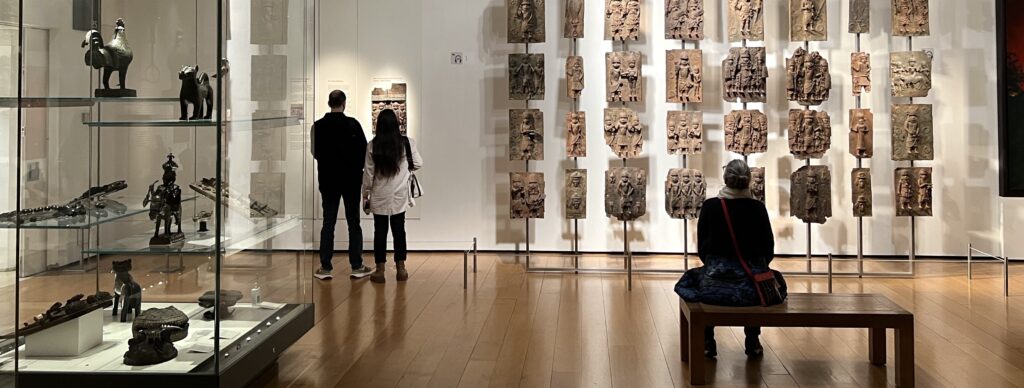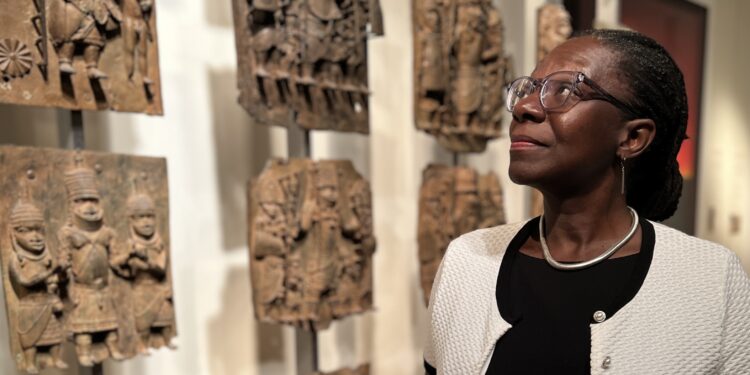The campaign to save Benin bronzes in the world’s museums was unexpectedly boosted in Zurich last Saturday. New York lawyer Deadria Farmer-Paellmann, herself descended from Africans the Benin kingdom captured and sold, announced to a packed symposium that Swiss museums are getting it wrong: by conspiring to send their Benin artefacts to Nigeria, they are sidelining Benin’s own victims. Farmer-Paellmann, founder of the Restitution Study Group (RSG) is shown above on her visit to the British Museum’s Africa gallery in September
The Rietberg Museum’s ticket-only event was supposed to celebrate a long campaign by Benin Initiative Switzerland (BIS) to purge the country’s museums of colonial-era relics from Benin: only invited speakers must address the meeting, no questions from the floor – what could possibly go wrong? The museum had kept the event quiet and tried to exclude the RSG: but Farmer-Paellmann got a ticket anyway, and rising to her feet she told the meeting that descendants of Benin’s slaves demand a seat at the table, wherever the fate of museums’ Benin collections is being decided.

Filmed by her husband, Farmer-Paellmann brandished a small manilla, one of the brass ingots with which Portuguese and other traders bought slaves from the Obas of Benin. To the consternation of the platform speakers and with the audience of 150 initially stunned but then applauding, she declared that the “bronzes” in Swiss museums were cast from exactly this brass. This makes it “Blood Metal” as far as tens of millions of black people in USA, Brazil and the Caribbean who descend from slaves sold by West Africa’s kingdoms are concerned.
An alarmed Olugbile Holloway, Director-General of Nigeria’s National Commission for Museum and Monuments (NCMM), cancelled his dinner and from the platform invited Farmer-Paellmann to an immediate, closed-door meeting with the Rietberg’s Director – which then went on for two hours – to learn more about RSG’s stance. With only a BA in politics and international relations and a Master’s in business administration, Holloway has no clear qualification for his role of safeguarding Nigeria’s heritage. How he will now explain to the President who appointed him what the RSG’s dramatic intervention means would be interesting to hear.
Restitutions of Benin collections from Cambridge and Oxford university museums, and also the German states of Saxony and Bavaria, were suddenly derailed in May 2023 after Nigeria’s president decreed that all restitutions to the NCMM will be gifted to the current Oba of Benin, a private citizen. Farmer-Paellmann will be back in Zurich this week to meet the Rietberg Museum’s Director and others; perhaps Switzerland’s mass restitution will be put on hold too. Nigeria’s own Benin collections, gifted by the British but depleted by local looting since independence in 1960, were not included in the President’s handover, and have still not been audited.

Also at the Rietberg, and also not invited to speak, was Prof. Brigitta Hauser-Schaüblin, the Swiss social anthropologist who specialises in cultural property and ownership: she distributed to delegates a paper explaining why the Swiss BIS project is so misguided, and the Rietberg’s current exhibition of its bronzes so misleading. “The Benin court,” she points out, “has never officially acknowledged or apologised for its crimes against humanity and war crimes to the descendants of slaves in the U.S., the Caribbean and Brazil.” In this dramatic clip from the symposium – watch up to minute 2:20 – Prince Patrick Oronsaye of Benin makes a doomed attempt to deny that the kingdom cast its bronzes from slave metal or even sold slaves at all: which is not what he says on p32 of Barnaby Phillips’s 2021 book “Loot”.
Campaigns need funding, especially one so morally myopic and race-obsessed as the present campaign to strip the world’s museums of their Benin collections. But as the RSG says, why reward Africa’s slave-sellers twice? Step forward the George Soros-funded Open Society. It’s becoming clear that generous funding has been on offer to the campaign to convince museum trustees and directors – not bad people themselves, but sometimes badly advised – that they must “decolonise” their museums and hand over their “looted” artefacts.
Open Society was once again behind Sunday’s London “U.K. Reparations Conference 2024” organised by the “All-Party Parliamentary Group for Afrikan [sic] Reparations“, chaired by Bell Ribeiro-Addy MP. The RSG’s view that museums’ Benin collections represent “Stolen Souls, not Stolen Goods” has been sidelined so far, but it may be time for museums’ approach to change.
The Benin collections can be their opportunity to tell the full story of the revolting slave trade: how Africa’s kingdoms procured and sold their slaves to European dealers, how Britain became the first to outlaw this trade, and how the Royal Navy’s West Africa Squadron’s blockade intercepted other nations’ slave ships for half the 19th century, liberating tens of thousands of shackled slaves in the process. It may be time to describe the Royal Navy’s Benin Expedition in February 1897 as one of the 19th century’s great humanitarian achievements, by deposing Oba Ovonramwen and his regime of slavery and massed human sacrifice, while carting away his blood-encrusted trophies in the process.

Benin’s medieval artworks (above, the British Museum’s Benin gallery) have a far wider story to tell future generations than is currently being attempted. Though for any museum bold enough to tell the whole unvarnished truth, Soros’s Open Society may not be the place to go looking for grant aid.












To join in with the discussion please make a donation to The Daily Sceptic.
Profanity and abuse will be removed and may lead to a permanent ban.
WE haven’t forgotten anything. A part.of society won’t tolerate disagreement. Not just with covid but with climate change and race and gender issues and a growing number of topics.
Strangely as well, it doesn’t seem to be the issues as much as the people themselves. It seems to be that those who are intolerant about covid are also the same people who are intolerant about climate change and about “diversity”.
It’s the same horrible people over and over again.
Very well said – and that intolerant part of society may be summed up as the modern, Marxist Left.
And yet, in the soft and soggy centre too, whilst you will often hear pious exclamations over the intolerance of our day, these will give way immediately – but immediately – to censorious panic when its own tolerance for officially stigmatised thinking is tested.
It is as if a herd instinct has been harnessed and monopolised among centrist water buffalo by a pack of Marxist jackals – and indeed it has, for their moral coordinates are no longer those of Christianity but those of “progressivism”, in which the culture, the justified self-interest and the perpetuation of their own societies have been put beyond the pale.
This explains the mysterious cloud of taboo which has been settled over the matter of immigration, even as the left hauls it towards full throttle transformation. No issue of society or state is unaffected by it, from policing to housing but if it is raised in the course of discussion – as Lionel Shriver found – an icy disapproval wafts from the bien-pensants.
Being seen as “nice” seems to be the new religion of the “educated” middle class. As I seem to be a horrible selfish person, I have not been afflicted.
I’d add Ukraine to the list if I may.
It is horribly fascinating to observe how easy it is to get so many people to believe in, well, anyhing the BBC/Government propaganda machine tell them to.
I agree that it’s the same horrible people over and over again, their job being made easier now simply because people lack the ability to actually think.
And that is mainly due to our wonderful education system.
I have a feeling that these people have never been disagreed with in their lives. I am sure you have seen the little brats out in public spaces demanding things of their parents and screaming until they get their way, schooled through child-centred education and finished in permissive, safe-space universities. They have never grown up.
Well may the force be with this doctor because he’s courageous and principled enough to be taking on TPTB who indiscriminately persecute anyone they deem as a threat to their various agendas and who won’t be bullied into submission so as to toe the line; healthcare staff get hauled over the coals and medical licenses threatened, teachers get sacked for speaking up about safeguarding issues of kids or misgendering pupils, members of the public have their bank accounts cancelled if they step out of line regarding the woke cult or expressing political views which don’t jive with the narrative, etc etc, which brings me on to this rather excellent article which I think hits the nail on the head;
”Globalists are seeking to subjugate the world, and to do that they need to undermine the basic tenets of human interaction and understanding. They have allied with the political left in order to blitz the populace with chaos, keeping people distracted and off balance while the powers-that-be wrap their tentacles around every last vestige of private liberty.
Globalists view power in a similar manner to leftists, but they expand on the manifesto with the question “How can we convince others to give us control willingly?”
Woke useful idiots see power as something that must be stolen through intimidation or force. Globalists see power as something that is handed to them by useful idiots. In order to get that power, globalists spend the vast majority of their energy and wealth on the manufacturing of consent. It’s not enough to control the population, you have to make them believe that your oligarchy is THEIR IDEA. That way, they never try to fight back.
For example, look at the recent covid “crisis” and the draconian response that the majority of leftists supported. Also look at the hysterical climate change narratives and the calls for carbon restrictions that would inevitably lead to mass depopulation; once again largely supported by the political left.
Both agendas rely on the notion of an existential threat that requires people to sacrifice their freedoms on a micro-level. Yet, covid mandates suggest that we need to save the population from death while climate change mandates suggest that we need to kill most of the population to protect the environment. It doesn’t make sense unless you understand that diminishing freedom is the ultimate point. Covid was never about saving lives and climate controls have nothing to do with saving the planet.”
https://www.zerohedge.com/geopolitical/understanding-parasitic-cooperation-between-globalists-and-leftists
“Doctor Sues Canadian University for Allegedly Pushing Him Out of Job Over His Covid Opinions”I wonder why Out, Over, Him and His are capitalised – are these important words? – and not for or of.
One does not sue anyone for allegedly doing something. That is tautology.
https://titlecaseconverter.com/rules/
You can have any opinion, just as long as it’s the same opinion as the authorities’ opinion.